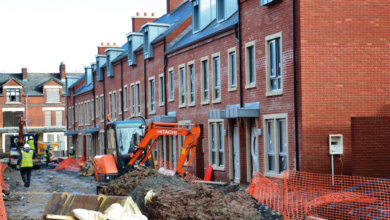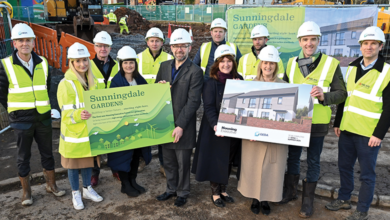Housing priorities

Mark O’Donnell, Deputy Secretary of Housing, Urban Regeneration and Local Government at the Department for Communities (DfC) discusses housing priorities and the progress made in implementing the transformative housing programme.
“The first priority was the Housing Supply Strategy, aimed at giving everybody access to a good quality, affordable and sustainable home suitable to their needs and located within a thriving, inclusive community,” O’Donnell begins. Amid rising levels of housing stress and homelessness, affordability issues for those buying and renting, and the current cost of living crisis, O’Donnell reasons that the strategy sets out a policy framework within which difference-making programmes can be developed.
“This is what we call the whole-system approach and I am pleased that that approach has been broadly welcomed by all of our stakeholders and partners,” he says. “The whole-system approach emphasises that there is no single challenge to housing supply here; it is a range of challenges and the combination of those that means that we are not able to provide the right volume and type of homes in the right places.”
The Deputy Secretary explains that the vision for housing is underpinned by objectives to increase housing supply across all tenures, prevent homelessness, reduce housing stress, and prioritise housing solutions for those most in need, improve the quality of housing, build thriving and inclusive communities, and support a just transition to carbon neutrality.
“Clearly, we need more social houses,” O’Donnell says. “The most significant capital investment our Department makes to address housing need is through the Social Housing Development Programme it operates with the Housing Executive and housing associations to develop new social homes.”
2,403 housing units were started in the financial year 2020/21, the highest figure achieved in 10 years. “In 21/22 we spent £171 million on new-build social housing, which is the highest spend that we have ever achieved in a single year and a total of 1,713 starts were achieved by the end of March 2022,” O’Donnell adds.
“This year, more than any year previously, we have demonstrated that it is really difficult to work within an annual budget. It gives you an artificial cut off point. It adds weight to the challenges that the absence of a functioning Executive and a multi-year budget pose.”
A significant challenge facing housing in Northern Ireland is the revitalisation of the Housing Executive, as laid out by former Minister for Communities Carál Ní Chuilín MLA. O’Donnell says that work to date has established the “clear and pressing need for intervention” to prevent the loss of social homes and to enable the significant and growing investment requirement to be met.
“The whole-system approach emphasises that there is no single challenge to housing supply here; it is a range of challenges.”
Revitalisation of the Housing Executive will include its allocation of social housing. The Fundamental Review of the Allocation of Social Housing, which was published in 2020, is now at implementation stage, with 18 of the 20 proposals progressed over the next three years subject to funding.
“Social housing is not the only housing we need,” O’Donnell adds. “If we are to meet our housing needs, we have to deliver affordable homes. The Department continues to provide significant funding for co-ownership as our main partner for the delivery of immediate homes here. That has enabled over 30,000 people to buy their homes, many for the first time. We have £158 million of financial transactions capital loan funding approved to deliver over 4,000 affordable homes through co-ownership over a four-year programme. The Department has also increased co-ownership’s property value limited from £165,000 to £175,000 and we hope that will ensure that people can continue to access affordable homes right across Northern Ireland and we will keep co-ownership’s property value limit under review to ensure it remains set at an appropriate level.”
The private rented sector has by now become the biggest part of Northern Ireland’s housing market, and the introduction of the Private Tenancies Act has sought to regulate the sphere, bringing safety requirements, minimum energy efficiency requirements and strengthened security of tenure to renters. This is just the beginning, O’Donnell says: “The next phase of that private sector reform will include regulation of letting agents, the introduction of Grounds for Eviction, consideration of how we can ensure rents area fair and a review of fitness standards across all tenures.”
As homelessness rises, O’Donnell points to the £72.8 million of protected funding in the Supporting People Programme every year since 2015/16 from his department as evidence of work being done, but also reinforces the need for long-term planning to be supported with a multi-year budget.
Concluding, he turns to the climate agenda facing all sectors, but not least housing which faces a radical decarbonisation over the next decade: “The question is: how do we fulfil our housing targets at the same time as fulfilling our obligations to meet net zero targets? How do we support households to decrease transmissions in houses they already have and how do we ensure a just transition for those most vulnerable? Those are the main questions facing us as we find ourselves on the pathway to zero carbon by 2050. We don’t have all the answers to that, but we do address it in our housing supply strategy, and the green growth energy strategies. All of those provide us with the framework for the changes that we need to make.”





